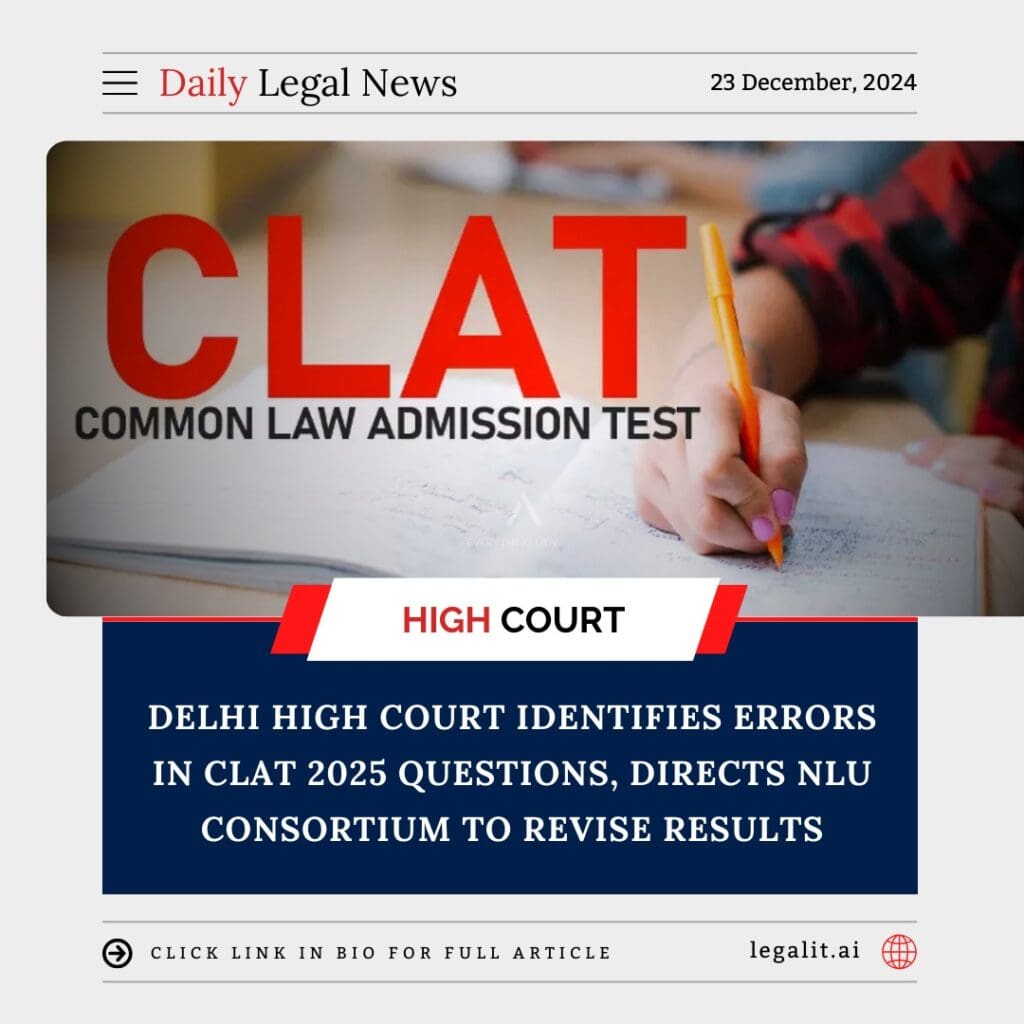
The Delhi High Court has identified errors in two questions from the CLAT 2025 examination, leading to an order for the National Law Universities (NLU) Consortium to revise the results accordingly. The errors in the exam’s questions had raised concerns among aspirants and their families, who argued that such discrepancies could affect the fairness and integrity of the competitive exam. The court’s intervention has brought attention to the importance of accuracy in entrance exams and the responsibility of the exam authorities to ensure that such errors are rectified promptly.
Background
The Common Law Admission Test (CLAT) is a nationwide entrance exam used for admissions to various National Law Universities in India. The 2025 edition of the exam, held on May 2025, saw widespread complaints from candidates regarding the two problematic questions. According to the petitioners, these questions had errors that rendered them either ambiguous or incorrect, leading to confusion and unfair evaluation.
The petitioners, who included students who appeared for the exam, argued that the errors were substantial enough to affect their chances of securing a seat in the prestigious NLUs. They claimed that these discrepancies compromised the exam’s credibility and integrity. As a result, they filed a petition seeking a revision of the results and an explanation from the NLU Consortium, which oversees the conduct of the exam.
After reviewing the issues raised in the petition, the Delhi High Court found merit in the claims, acknowledging that the errors in the questions could have led to unfair marking. The court directed the NLU Consortium to re-evaluate the exam results, ensuring that the errors were accounted for in the final outcome.
Key Arguments
Petitioner’s Concerns
- Ambiguity and Incorrectness of Questions: The petitioners highlighted that the two questions in question contained either factual inaccuracies or were framed in such a way that candidates could not reasonably interpret them. They argued that such errors were not only unfair to the students but also affected their future career prospects.
- Impact on Exam Results: The petitioners contended that the presence of such errors directly impacted the scores of those who appeared for the exam. They asserted that the examination’s credibility would be severely compromised if corrective measures were not taken.
Respondents’ Position
- In Defense of the Exam Conduct: The NLU Consortium argued that the exam was conducted according to the prescribed guidelines and that the questions were vetted by experts. They acknowledged the concerns raised by the candidates but insisted that the issue, if any, did not warrant a re-evaluation of the entire examination.
- Fairness of the Exam: The Consortium emphasized that the exam’s overall fairness was not jeopardized and that adequate mechanisms were in place to ensure the validity of the results.
Court’s Observations
- Ensuring Fair Evaluation: The Delhi High Court emphasized that the integrity of entrance exams like CLAT is paramount, especially given the significant impact they have on a student’s academic and professional future. The court noted that errors in such exams cannot be overlooked, as they could lead to irreversible consequences for the affected candidates.
- Immediate Action Ordered: The court ordered the NLU Consortium to take corrective action immediately by revising the results in light of the errors. It stressed that the revised results should be issued promptly to avoid any further delays in the admission process.
Legal and Policy Implications
Strengthening Accountability in Competitive Exams
The case highlights the importance of accountability in the conduct of competitive exams, particularly those that determine admission to prestigious educational institutions. The ruling stresses that any errors, whether intentional or accidental, must be rectified to maintain the trust and fairness of the examination system.
Impact on Exam Administration
The court’s decision could lead to a reassessment of how entrance exams like CLAT are administered. It may prompt the NLU Consortium to adopt more stringent measures to ensure the accuracy of the questions and their fairness. This ruling also emphasizes the need for thorough vetting processes in exam preparation.
Student Welfare and Legal Protections
This ruling reinforces the idea that students have legal recourse if they believe they have been treated unfairly in examinations. It also highlights the judiciary’s role in protecting the rights of students, ensuring that their future opportunities are not compromised due to administrative mistakes.
Conclusion
The Delhi High Court’s ruling in favor of the petitioners and its order to revise the results of CLAT 2025 underscores the need for meticulous care in the conduct of competitive exams. The judgment reiterates the importance of fairness and accuracy in entrance exams that significantly impact students’ futures. By directing the NLU Consortium to correct the errors and revise the results, the court has ensured that the integrity of the exam process is upheld, providing a fairer chance to candidates who were affected by the discrepancies. This case serves as a reminder of the need for constant vigilance in the administration of high-stakes examinations.